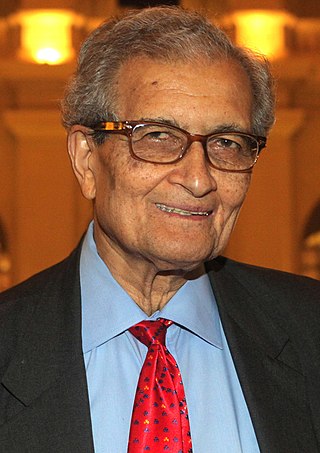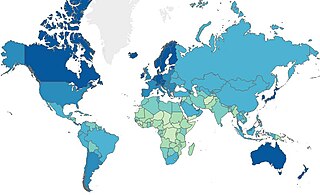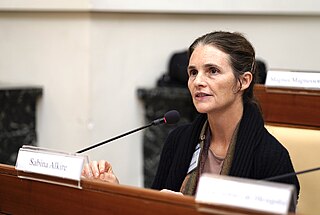
David Émile Durkheim was a French sociologist. Durkheim formally established the academic discipline of sociology and is commonly cited as one of the principal architects of modern social science, along with both Karl Marx and Max Weber.
Quality of life (QOL) is defined by the World Health Organization as "an individual's perception of their position in life in the context of the culture and value systems in which they live and in relation to their goals, expectations, standards and concerns".

In sociology, anomie or anomy is a social condition defined by an uprooting or breakdown of any moral values, standards or guidance for individuals to follow. Anomie is believed to possibly evolve from conflict of belief systems and causes breakdown of social bonds between an individual and the community.

Amartya Kumar Sen is an Indian economist and philosopher. Sen has taught and worked in England and the United States since 1972. In 1998, Sen received the Nobel Memorial Prize in Economic Sciences for his contributions to welfare economics. He has also made major scholarly contributions to social choice theory, economic and social justice, economic theories of famines, decision theory, development economics, public health, and the measures of well-being of countries.

In the economics study of the public sector, economic and social development is the process by which the economic well-being and quality of life of a nation, region, local community, or an individual are improved according to targeted goals and objectives.
Economic freedom, or economic liberty, refers to the agency of people to make economic decisions. This is a term used in economic and policy debates as well as in the philosophy of economics. One approach to economic freedom comes from the liberal tradition emphasizing free markets, free trade, and private property. Another approach to economic freedom extends the welfare economics study of individual choice, with greater economic freedom coming from a larger set of possible choices. Other conceptions of economic freedom include freedom from want and the freedom to engage in collective bargaining.

Gross National Happiness, sometimes called Gross Domestic Happiness (GDH), is a philosophy that guides the government of Bhutan. It includes an index which is used to measure the collective happiness and well-being of a population. Gross National Happiness Index is instituted as the goal of the government of Bhutan in the Constitution of Bhutan, enacted on 18 July 2008.

Development theory is a collection of theories about how desirable change in society is best achieved. Such theories draw on a variety of social science disciplines and approaches. In this article, multiple theories are discussed, as are recent developments with regard to these theories. Depending on which theory that is being looked at, there are different explanations to the process of development and their inequalities.

The capability approach is a normative approach to human welfare that concentrates on the actual capability of persons to achieve lives they value rather than solely having a right or freedom to do so. It was conceived in the 1980s as an alternative approach to welfare economics.

The Happy Planet Index (HPI) is an index of human well-being and environmental impact that was introduced by the New Economics Foundation in 2006. Each country's HPI value is a function of its average subjective life satisfaction, life expectancy at birth, and ecological footprint per capita. The exact function is a little more complex, but conceptually it approximates multiplying life satisfaction and life expectancy and dividing that by the ecological footprint. The index is weighted to give progressively higher scores to nations with lower ecological footprints.
Sustainability metrics and indices are measures of sustainability, using numbers to quantify environmental, social and economic aspects of the world. There are multiple perspectives on how to measure sustainability as there is no universal standard. Intead, different disciplines and international organizations have offered measures or indicators of how to measure the concept.
Wikiprogress is a defunct online platform for sharing information on the measurement of social, economic and environmental progress. It is thought to facilitate sharing on ideas, initiatives and knowledge on "measuring the progress of societies". Like Wikipedia, it was open to all members and communities for contribution – anyone interested in "progress" could register.
Although for many decades, it was customary to focus on GDP and other measures of national income, there has been growing interest in developing broad measures of economic well-being. National and international approaches include the Beyond GDP programme developed by the European Union, the Better Lives Compendium of Indicators developed by the OECD, as well as many alternative metrics of wellbeing or happiness. One of the earliest attempts to develop such an index at national level was Bhutan's Gross National Happiness Index and there are a now a number of similar projects ongoing around the world, including a project to develop for the UK an assessment of national well-being, commissioned by the Prime Minister David Cameron and led by the Office for National Statistics.

The Social Progress Index (SPI) measures the extent to which countries provide for the social and environmental needs of their citizens. Fifty-four indicators in the areas of basic human needs, foundations of well-being, and opportunity to progress show the relative performance of nations. The index is published by the nonprofit Social Progress Imperative, and is based on the writings of Amartya Sen, Douglass North, and Joseph Stiglitz. The SPI measures the well-being of a society by observing social and environmental outcomes directly rather than the economic factors. The social and environmental factors include wellness, equality, inclusion, sustainability and personal freedom and safety.

Sabina Alkire is an American academic and Anglican priest, who is the director of the Oxford Poverty and Human Development Initiative (OPHI), an economic research centre within the Oxford Department of International Development at the University of Oxford, England, which was established in 2007. She is a fellow of the Human Development and Capability Association. She has worked with organizations such as the Commission on the Measurement of Economic Performance and Social Progress, the United Nations Human Development Programme Human Development Report Office, the European Commission, and the UK's Department for International Development.

In statistics and research design, an index is a composite statistic – a measure of changes in a representative group of individual data points, or in other words, a compound measure that aggregates multiple indicators. Indices – also known as indexes and composite indicators – summarize and rank specific observations.
Pamela Abbott, FAcSS is an English academic in sociology, gender and development studies. She is Director of the Centre for Global Development and Professor in the School of Education at the University of Aberdeen, and Director of the Centre for Global Development.

Kirsten Sehnbruch is a British Academy Global Professor and Distinguished Policy Fellow at the International Inequalities Institute at the London School of Economics and Political Science. Sehnbruch is known for her work on conceptualising and measuring the quality of employment, particularly in developing countries. Her research subjects include quality of employment, multidimensional indicators, Latin American labour markets, labour relations, Chilean politics and public policy.
Peter Herrmann is a social philosopher, sociologist and academic of German origin. Between 1995 and 2013 he worked in Ireland where he occupied at the end the position of a senior research fellow at University College Cork, School of Applied Social Studies. 2013 he moved to Rome, Italy, where he worked independently, but in close connection with the Italian research institute EURISPES. From 2015 to 2017 he worked as Professor for Economics at Bangor College of Central South University of Forestry & Technology, Changsha, PRC, and as Senior Foreign Expert. School of Public Affairs, Dept. of Social Security and Risk Management, Zhejiang University, Hangzhou, P.R.China. In September 2017 he commenced a one-year research position at the Max Planck Institute for Social Law and Social Policy in Munich, Bavaria, from where he changed in October 2018 to the Faculty of Economics and Sociology at the University of Lodz in Poland. Since October 2019 he is research fellow at the Human Rights Centre. Law School at Central South University, Changsha, PRC.
Creating Capabilities is a book, first published by Martha Nussbaum in 2011, which outlines a unique theory regarding the Capability approach or the Human development approach. Nussbaum draws on theories of other notable advocates of the Capability approach like Amartya Sen, but makes specific distinctions. One distinct idea she proposes is to choose a list of capabilities based on some aspects of John Rawls' concept of "central human capabilities." These ten capabilities encompass everything Nussbaum considers essential to living a life that one values. Martha Nussbaum and Amartya Sen are considered to be the main scholars of this approach, but have distinctions in their approach to capabilities. Sen disagrees with Nussbaum's list of values on the grounds that it does not fully encompass the range of capabilities one would consider to live a fulfilling life, which inherently differs by person.












